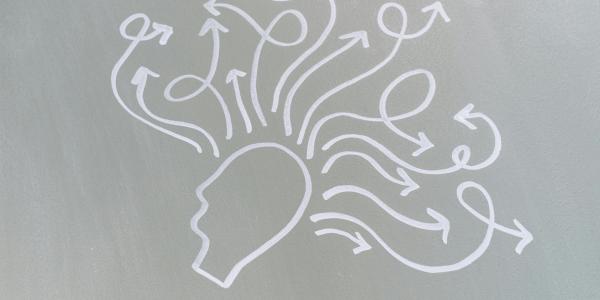U.S. News & World Report recently named WashU’s psychology graduate program one of the top 10 in the nation. Learn about some of the groundbreaking work being done by graduate students in the Department of Psychological & Brain Sciences.
Graduate students in WashU’s Department of Psychological & Brain Sciences have been at the forefront of some of the most significant research taking place in the field of psychology. Collaborating with the department’s talented faculty and researchers across WashU, these students have made discoveries with direct implications for human health and well-being.
The strength of the PhD program was recently recognized at the national level when U.S. News & World Report named WashU’s psychology graduate program one of the top 10 in the country — a testament to the continued momentum the department is building in areas including emotion regulation, human memory, clinical science, and lifespan development.
We’ve rounded up eight recent examples of graduate-student-led studies with real-world impact.
Cultivating a sense of purpose can help college students thrive

Graduate student Jennifer Beatty and Professor Patrick Hill surveyed hundreds of college students — including 200 at WashU — to show how a sense of purpose can improve self-management skills and overall life satisfaction. The researchers found a relatively small connection between having a sense of purpose and getting good grades or finishing a degree on time. Still, a sense of purpose can help students change their behaviors to achieve their goals, Beatty said. “It really is a skill to be able to focus your life and energy on things that matter to you,” she said.
Harnessing ‘happy scrolling’ for improved mental health

Graduate student Alison Tuck co-authored a study with Associate Professor Renee Thompson showing that young and middle-aged adults often turn to social media when they’re sad, worried, or frustrated. “It’s not just a coincidence,” Tuck said. “Adults may be actively seeking out social media because they think it will make them feel better.” Tuck and Thompson are now looking to identify specific social media activities that can improve mood — a potentially powerful approach to emotional well-being in this connected age. “If Instagram, TikTok, or another platform provides a fun escape or helps people keep in touch and stay informed without interfering with the rest of their lives, scrolling can be healthy,” Tuck said.
Protecting people with disabilities from psychological distress

First-year graduate student Payton Rule is embarking on a project that will explore the psychological well-being of people with disabilities. Working with Assistant Professor Emily Willroth, Rule will document experiences with discrimination and identify specific ways that society may be able to help protect people with disabilities from the psychological distress caused by unfair treatment. The project is supported by the American Psychological Foundation, which awarded Rule a prestigious early career award for her work.
Leveraging the positive power of distraction

Graduate student Xiaojin Ma teamed up with Professor Richard Abrams to show that distractions can help us focus on what matters. Ma and Abrams found that college students could spot an image on a computer screen more quickly if it was near a “distractor” object. “We are always performing some sort of visual task where we’re looking for something,” Ma said. “Being able to ignore a distractor can help you better focus on what’s relevant.” Their insights could apply to high-stakes situations that demand close attention, such as radiologists looking for anomalies on an X-ray or TSA workers scanning luggage for weapons.
Developing a deeper understanding of how the brain processes daily life

Tan Nguyen, a graduate student in the Dynamic Cognition Laboratory, co-authored a study that explored a key process of human thought. Working with Jeff Zacks, the Edgar James Swift Professor in Arts & Sciences, Nguyen helped train computer models to observe and predict scenes of everyday life. The computer model — built to work something like a human brain — took a surprising approach to uncertainty, offering new insights into the strategies the brain likely employs to process the world. Nguyen, Zacks, and other teammates plan to use fMRI imaging to track the brain activity of people watching everyday events. The work should clarify the neurological basis of cognition.
Unlocking a new tool in the fight against dementia

Graduate student Karysa Britton is working with Assistant Professor Emily Willroth to learn how the habits and behaviors that promote happiness — such as getting regular exercise and engaging in social activities — can reduce the risk of dementia. They also want to know if happiness and happiness-related behaviors can help slow cognitive decline once it starts.
Building mental maps influences everyday decision-making

Graduate student Ata Karagoz helped design and conduct an experimental study that explored the ways people build cognitive maps, mental models of the world that help us navigate our lives. Through question-and-answer experiments that required subjects to make a series of choices towards a goal, researchers were able to observe people building cognitive maps in real time. Before, the process was only observable with fMRI or other brain imaging technologies. Assistant professors Wouter Kool and Zachariah Reagh co-authored the study. “We use cognitive maps constantly for a variety of decisions,” Karagoz said. “It’s useful to know how people construct them.”
Tracing the impact of a parent’s personality on their child’s life

Former graduate student Amanda Wright, now a postdoctoral researcher at the University of Zurich, and Joshua Jackson, the Saul and Louise Rosenzweig Associate Professor of Personality Sciences in Arts & Sciences, published a study showing that basic aspects of a parent’s personality can have a profound impact on a child’s health, grades, and more. Among other findings, Wright and Jackson showed that children with extraverted parents tended to have lower grades, and children with neurotic parents scored relatively low on several measures, including grades, overall health, body mass index (BMI), and time spent on leisure activities.





